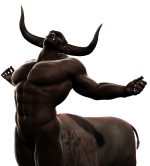Difference between revisions of "Uhlak"
Trismegistus (talk | contribs) m |
Trismegistus (talk | contribs) m |
||
| Line 1: | Line 1: | ||
| − | The uhlak is a therianthrope -- a half-man, half-beast creature, also known as a bisontaur. An uhlak has the body of a bison, the torso of a human, and a bovine (or minotaur-like) head. They are attested according to well-known legends and petroglyphs to have existed before the Great Flood. There are a few schools of thought that describe the origin of the uhlak. Some scholars ascribe their creation to powerfully advanced titan wizards while others posit that the uhlak is a natural creation of the earth. Scholars sometimes call uhlaks the bisontaurs. | + | The uhlak is a therianthrope -- a half-man, half-beast creature, also known as a bisontaur. An uhlak has the body of a bison, the torso of a human, and a bovine (or minotaur-like) head. The average male uhlak stands about 7'4" and weighs about 2500. They live to about 50 to 55 years of age on average. Uhlaks are attested according to well-known legends and petroglyphs to have existed before the Great Flood. There are a few schools of thought that describe the origin of the uhlak. Some scholars ascribe their creation to powerfully advanced titan wizards while others posit that the uhlak is a natural creation of the earth. Scholars sometimes call uhlaks the bisontaurs. |
The greatest range of the uhlak is [[Eloaria]] in western Asdauria where they are kept at bay by the mighty army of the Empire of Aurice. Despite their bovine features, the Uhlak are nomadic omnivores. They will eat fish and small game, but prefer grass or domestic crops. Their appetite for corn (wheat and otherwise) often brings them into conflict with humans as the uhlak usually do not plant or harvest their own crops. | The greatest range of the uhlak is [[Eloaria]] in western Asdauria where they are kept at bay by the mighty army of the Empire of Aurice. Despite their bovine features, the Uhlak are nomadic omnivores. They will eat fish and small game, but prefer grass or domestic crops. Their appetite for corn (wheat and otherwise) often brings them into conflict with humans as the uhlak usually do not plant or harvest their own crops. | ||
Latest revision as of 20:28, 18 June 2015
The uhlak is a therianthrope -- a half-man, half-beast creature, also known as a bisontaur. An uhlak has the body of a bison, the torso of a human, and a bovine (or minotaur-like) head. The average male uhlak stands about 7'4" and weighs about 2500. They live to about 50 to 55 years of age on average. Uhlaks are attested according to well-known legends and petroglyphs to have existed before the Great Flood. There are a few schools of thought that describe the origin of the uhlak. Some scholars ascribe their creation to powerfully advanced titan wizards while others posit that the uhlak is a natural creation of the earth. Scholars sometimes call uhlaks the bisontaurs.
The greatest range of the uhlak is Eloaria in western Asdauria where they are kept at bay by the mighty army of the Empire of Aurice. Despite their bovine features, the Uhlak are nomadic omnivores. They will eat fish and small game, but prefer grass or domestic crops. Their appetite for corn (wheat and otherwise) often brings them into conflict with humans as the uhlak usually do not plant or harvest their own crops.
The Uhlak of Eloaria were largely subdued by Aurice during a succession of wars of expansion in the 2600's. Today, uhlak princes can be found as 'foster' representatives held in residence in Aurice as a result of agreements made in the 27th century. In Aurice, the uhlak princes learn the Throvian Language and the laws and customs of the Aurician Empire.
Brasen Horde
Most of the uhlaki tribes are tributaries of the Shakhumbla, the ruling over-king of the Brasen Horde. The Shakhumbla dwells part of the time at his court in Aiak in central Asdauria.
Modern Tribes of the Uhlaks
- Asklahri
- Eberns
- Kutts
- Jahmuts
- Ulaskees
- Parmutes
- Amboyars
- Emeddeem
- Kettomunes
- Magutes
- Onkhutes
See Also
- Arwine
- Bearfolk, See Grawlf
- Beastfolk
- Centaur
- Expansion of Inland Aurician Empire in Late 2600's
- Leontaur
- Therianthrope
| This article is a stub. It requires further development by the creator. |
